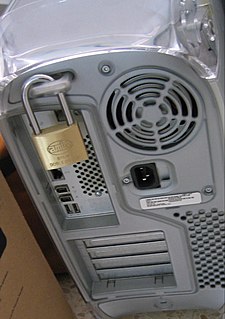
Computer security, cybersecurity or information technology security is the protection of computer systems and networks from information disclosure, theft of or damage to their hardware, software, or electronic data, as well as from the disruption or misdirection of the services they provide.

The Chaos Computer Club (CCC) is Europe's largest association of hackers with 7700 registered members. Founded in 1981, the association is incorporated as an eingetragener Verein in Germany, with local chapters in various cities in Germany and the surrounding countries, particularly where there are German-speaking communities. Since 1985, some chapters in Switzerland have organized an independent sister association called the Chaos Computer Club Schweiz (CCC-CH) instead.
A computer hacker is a computer expert who uses their technical knowledge to achieve a goal or overcome an obstacle, within a computerized system by non-standard means. Though the term "hacker" has become associated in popular culture with a "security hacker" – someone who utilizes their technical know-how of bugs or exploits to break into computer systems and access data which would otherwise be unavailable to them – hacking can also be utilized by legitimate figures in legal situations. For example, law enforcement agencies sometimes use hacking techniques in order to collect evidence on criminals and other malicious actors. This could include using anonymity tools to mask their identities online, posing as criminals themselves. Likewise, covert world agencies can employ hacking techniques in the legal conduct of their work. Oppositely, hacking and cyber-attacks are used extra- and illegally by law enforcement and security agencies, and employed by State actors as a weapon of both legal and illegal warfare.

Windows XP is an operating system produced by Microsoft as part of the Windows NT family of operating systems. It was the successor to both Windows 2000 for professional users and Windows Me for home users. It was released to manufacturing on August 24, 2001, and broadly released for retail sale on October 25, 2001.

In Internet activism, hacktivism, or hactivism, is the use of computer-based techniques such as hacking as a form of civil disobedience to promote a political agenda or social change. With roots in hacker culture and hacker ethics, its ends are often related to free speech, human rights, or freedom of information movements.
A penetration test, colloquially known as a pen test, pentest or ethical hacking, is an authorized simulated cyberattack on a computer system, performed to evaluate the security of the system; this is not to be confused with a vulnerability assessment. The test is performed to identify weaknesses, including the potential for unauthorized parties to gain access to the system's features and data, as well as strengths, enabling a full risk assessment to be completed.
A hackathon is a design sprint-like event; often, in which computer programmers and others involved in software development, including graphic designers, interface designers, project managers, domain experts, and others collaborate intensively on software projects.

PlayStation Portable homebrew refers to the process of using exploits and hacks to execute unsigned code on the PlayStation Portable (PSP).

FreeBSD is a free and open-source Unix-like operating system descended from the Berkeley Software Distribution (BSD), which was based on Research Unix. The first version of FreeBSD was released in 1993. In 2005, FreeBSD was the most popular open-source BSD operating system, accounting for more than three-quarters of all installed simply, permissively licensed BSD systems.
Electronic voting by country varies and may include voting machines in polling places, centralized tallying of paper ballots, and internet voting. Many countries use centralized tallying. Some also use electronic voting machines in polling places. Very few use internet voting. Several countries have tried electronic approaches and stopped, because of difficulties or concerns about security and reliability.

Hacking at Random was an outdoor hacker conference that took place in the Netherlands from August 13 to August 16, 2009.
A computer security conference is a convention for individuals involved in computer security. They generally serve as meeting places for system and network administrators, hackers, and computer security experts.
In computers and computer networks an attack is any attempt to expose, alter, disable, destroy, steal or gain information through unauthorized access to or make unauthorized use of an asset. A cyberattack is any type of offensive maneuver that targets computer information systems, infrastructures, computer networks, or personal computer devices. An attacker is a person or process that attempts to access data, functions or other restricted areas of the system without authorization, potentially with malicious intent. Depending on context, cyberattacks can be part of cyberwarfare or cyberterrorism. A cyberattack can be employed by sovereign states, individuals, groups, society or organizations, and it may originate from an anonymous source. A product that facilitates a cyberattack is sometimes called a cyberweapon.

Telegram is a freeware, cross-platform, cloud-based instant messaging (IM) software and application service. The service also provides end-to-end encrypted video calling, VoIP, file sharing and several other features. It was initially launched for iOS on 14 August 2013 and Android in October 2013. The application servers of Telegram are distributed worldwide to decrease data load, while the operational center is currently based in Dubai. Various Telegram client apps are available for desktop and mobile platforms including official apps for Android, iOS, Windows, macOS and Linux, as well as for the now-discontinued Windows Phone. There is also an official web interface and numerous unofficial clients that make use of Telegram's protocol. All of Telegram's official apps are open source.
Regin is a sophisticated malware and hacking toolkit used by United States' National Security Agency (NSA) and its British counterpart, the Government Communications Headquarters (GCHQ). It was first publicly revealed by Kaspersky Lab, Symantec, and The Intercept in November 2014. The malware targets specific users of Microsoft Windows-based computers and has been linked to the US intelligence gathering agency NSA and its British counterpart, the GCHQ. The Intercept provided samples of Regin for download including malware discovered at Belgian telecommunications provider, Belgacom. Kaspersky Lab says it first became aware of Regin in spring 2012, but that some of the earliest samples date from 2003. Among computers infected worldwide by Regin, 28 percent were in Russia, 24 percent in Saudi Arabia, 9 percent each in Mexico and Ireland, and 5 percent in each of India, Afghanistan, Iran, Belgium, Austria and Pakistan.
Fancy Bear is a Russian cyber espionage group. Cybersecurity firm CrowdStrike has said with a medium level of confidence that it is associated with the Russian military intelligence agency GRU. The UK's Foreign and Commonwealth Office as well as security firms SecureWorks, ThreatConnect, and Fireeye's Mandiant, have also said the group is sponsored by the Russian government. In 2018, an indictment by the United States Special Counsel identified Fancy Bear as GRU Unit 26165.

Vault 7 is a series of documents that WikiLeaks began to publish on 7 March 2017, that detail activities and capabilities of the United States' Central Intelligence Agency to perform electronic surveillance and cyber warfare. The files, dated from 2013 to 2016, include details on the agency's software capabilities, such as the ability to compromise cars, smart TVs, web browsers, and the operating systems of most smartphones, as well as other operating systems such as Microsoft Windows, macOS, and Linux. A CIA internal audit identified 91 malware tools out of more than 500 tools in use in 2016 being compromised by the release.
Election cybersecurity or election security refers to the protection of elections and voting infrastructure from cyberattack or cyber threat – including the tampering with or infiltration of voting machines and equipment, election office networks and practices, and voter registration databases.
A global wave of cyberattacks and data breaches began in January 2021 after four zero-day exploits were discovered in on-premises Microsoft Exchange Servers, giving attackers full access to user emails and passwords on affected servers, administrator privileges on the server, and access to connected devices on the same network. Attackers typically install a backdoor that allows the attacker full access to impacted servers even if the server is later updated to no longer be vulnerable to the original exploits. As of 9 March 2021, it was estimated that 250,000 servers fell victim to the attacks, including servers belonging to around 30,000 organisations in the United States, 7,000 servers in the United Kingdom, as well as the European Banking Authority, the Norwegian Parliament, and Chile's Commission for the Financial Market (CMF).










